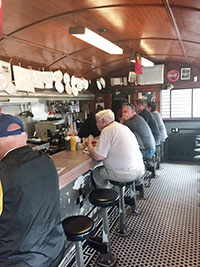
Buddy’s diner, where cook Monica can be found.
By JT Thompson
Monica: late 30s, is a line cook at Buddy’s, a tiny old railroad car diner on a mostly empty, industrial avenue, on the other side of the McGrath Highway from Union Square. Monica is second-generation Portuguese and grew up in Somerville, working in businesses run by her family. Her sister bought Buddy’s, which first opened in 1951, eleven years ago.
Monica has sharp features, a thin frame, pale skin, and dark hair pulled up into a tight bun; there are faint traces of blonde highlighting in the bun. She is wearing grey tights and a thin, black, boat-necked sweater, which shows her slender collarbones. No apron. She is in constant, energetic motion – tending the griddle, ducking into the back room, taking orders, bantering with the regulars.
When I walk in at 11:00 a.m., three older guys, grey haired and wearing work stained clothes, are sitting at the counter, two together talking, one at the far end alone, concentrating on his coffee. Monica gives me a cheerful hello, and so do the two guys who are sitting together.
Buddy’s has an old, burnished chrome exterior, a black and white mosaic floor inside – clean, but with dark cracks that show decades of use – and a row of stools facing the griddle across the counter. The door, a holdover from the diner’s life as a lunch car, slides open sideways. A classic American diner. And it has the feel of one – a place loved by regulars, and also a place where a stranger can stop by and share in the local community.
The menu is a row of white paper plates, slightly greasy with age, which are pinned up over the griddle, the dishes written on them in black magic marker. I order eggs over easy, bacon, hash browns, wheat toast, and a coffee, which is dark and strong. The food, when it comes, is good; hearty, but not greasy like the old paper plates.
While Monica bustles to and fro, Paul, a retired butcher who, I find out, sometimes comes by to help out, is peeling potatoes on the counter with a big carving knife. Paul’s blue shirt is unbuttoned all the way below his breast bone; he has his glasses hanging on the button there, and grey chest hair curls out of the open shirt up toward his bare throat. There’s a pack of L&M cigarettes in his shirt pocket. While he talks with the regulars, he gestures with the carving knife for emphasis. He’s got a nice smile, wispy remains of grey hair on his head, and his bright blue eyes are a little cloudy with age.
Monica notices me looking around and writing in my notebook, and asks if I’m doing a story on them.
I tell her about the project, and ask her what she loves about living in America. She’s moving fast while we talk – making my breakfast, giving people fresh coffees – and it’s hard to follow up for more detail on the things she says. I just keep up as best I can.
“Well, we have our freedom.
“Not as much as we used to have.
“It’s gotten worse. I feel bad for my kids.
“I think it will get better again.
“But, growing up, I could walk the streets. Now you need a weapon, or some mace.
“I work hard to protect my kids.
“I used to walk around with friends, we’d go to every park, go home at 8 or 9, felt safe the whole time. Now my kids have gotta be in by 4 or 5.
“The gangs, maybe from California … I don’t know. At the Mystic Projects – there’s gang related stuff going on there.”
One of the regulars, in battered jeans and a black sweatshirt, chimes in. “Yeah, it’s not like it used to be.”
When Monica was growing up, they would sometimes visit her parents’ families in Portugal.
“It was very different, my dad’s family was from the countryside. Milking cows, fresh eggs, fresh milk. The milk was warm, I didn’t like it at first, I had to get used to it.
“It was fun. Not forever, but nice to visit.
“Now, my dad’s rebuilding my great grandma’s house. We stay in touch. On my mom’s side in Portugal, there’s just my grandma left now in Lisbon.
“We’ve always had family businesses here. My mom ran the Portuguese fish market on Broadway. I always worked hard, I was at the register at 7 years old.
“I worked for somebody else for two years, I hated it. I didn’t like the way they treated people.
“I’ve been here for only two months, but no complaints from anyone yet!”
Monica turns to the two regulars. “It’s so quiet in here! Should I turn on the TV?”
“No!” says the guy in the black sweatshirt. “The radio is fine.”
On the counter in front of him is a big, round, bright orange mug which clearly belongs to him, not the diner.
Monica brings him some milk. “You and your milk. We’re going to have to start charging you.”
Black sweatshirt guy raises a fist and shakes it at her.
“Oh yeah?” says Monica, “I’ve got a right *and* a left.” She raises her fists and makes little punching gestures.
When she is back at my end of the counter, I ask again if there are things she likes about America.
“Don’t get me wrong,” she replies. “I love America. I’m a people person. Talking, socializing, all races.
“I have an old soul, it’s easier for me to talk to older people.”
I ask her if there are things about America that she thinks are great.
“Now? That’s kind of a hard one.
“We can make the choices we want, make our own decisions, make our life good.
“A lot of people don’t take advantage. They could have a job, a good family.
“Parents are too lenient now. Kids want everything. I was 7 when I was at the register. I was taught the value of a dollar.
“I am who I am today because my parents were strict. Now I’m a hardworking person.
“Too many people want things handed to them on a platter. They get into drugs. They’re not raised right. They want to get on welfare.
“Hard to remember what’s great. All the bad things come to mind.”
The guy in the black sweatshirt nods firmly and says, “I worked for everything I own.”
A young man and woman, who look like they’re members of Somerville’s recent wave of gentrification, come in the door. The guy is wearing a button down shirt and a suit coat; she’s in a green dress. Monica and the guys at the counter greet them with warm hellos.
They sit down to my left and start reading the dishes listed on the paper plates.
“Hmm, it looks like mostly breakfasty things,” says the guy.
“Oh! It’s cash only,” she says. They both rummage for money and decide they have enough to order.
On the wall behind the young couple, a rotary phone starts ringing. The regulars call out, in unison, “Hello! This is Buddy’s!” Monica disappears into the back.
Next in are two young guys who, with their close shaved heads, their work-worn jeans, big boots, and sweatshirts, look like ‘old school’ Somervilleans. Paul looks up from his potato peeling, and says, “What do you want for supper? I have a shoe, you can have fillet of sole…”
They laugh and place their order. Paul calls out to Monica, who is still in the back, “Hey hon, can we get a steak?”
The guy in the black sweatshirt says, “It’s so warm out. Let’s open the door.” He gets up and slides it open.
Monica, who has reappeared, says, “We never had weather like this when I was a kid. Sixty degrees in February! It’s global warming.”
Black sweatshirt guy says, “Ah, it’s a million year cycle. Don’t worry about it.”
Monica exclaims, “I am worried!”
Having eaten the last of my breakfast, I leave some cash on the counter, and say good bye. Monica, who’s got two omelets cooking in front of her, calls over her shoulder with a big smile, “Nice meeting you!”
Monica is tough and cheerful. But she’s worried for her kids.















Reader Comments